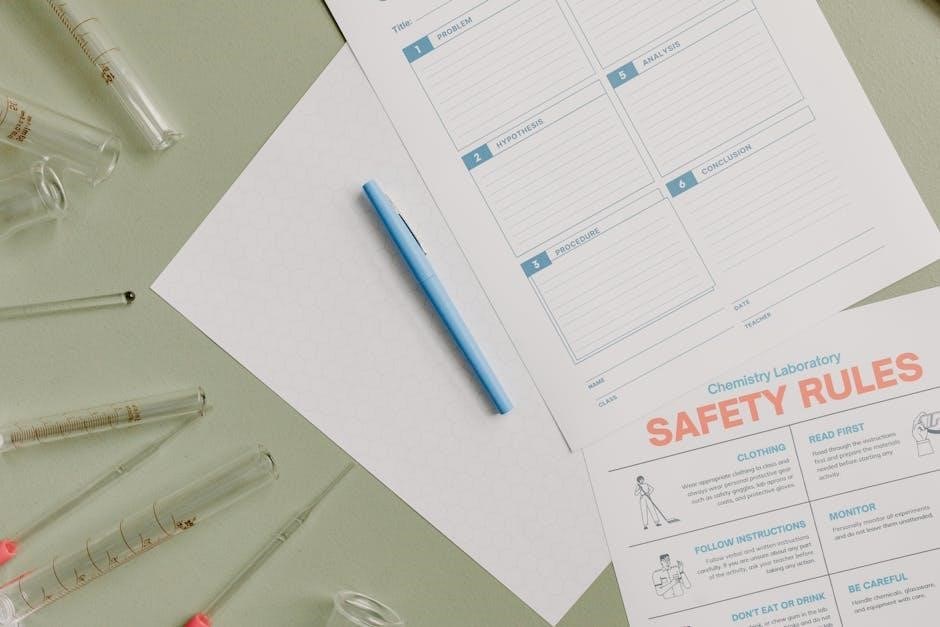School nurses face diverse health challenges daily, requiring preparedness for emergencies, chronic conditions, and mental health issues, making scenario-based training essential for effective response and student well-being.
1.1 Overview of School Nursing
School nursing involves providing healthcare services to students, ensuring a safe and healthy learning environment. Nurses address physical, mental, and emotional health needs, from minor injuries to chronic conditions. They collaborate with educators, parents, and healthcare providers to support student well-being. School nurses also promote health education, manage emergencies, and maintain accurate records. Their role is crucial in fostering academic success by ensuring students’ health needs are met, creating a foundation for lifelong health and learning.
1.2 Importance of Scenario-Based Training for School Nurses
Scenario-based training equips school nurses with practical skills to handle real-life situations, enhancing their ability to respond to emergencies, manage chronic conditions, and address mental health issues effectively. By simulating challenges like medical crises or behavioral incidents, nurses can improve decision-making, communication, and collaboration. This approach ensures they are prepared to provide high-quality care, adapt to unexpected events, and maintain student safety and well-being in diverse school settings, ultimately fostering a proactive and resilient healthcare environment.

Common School Nurse Scenarios
School nurses encounter a variety of challenges, including medical emergencies, chronic health conditions, and mental health issues, requiring quick decision-making and tailored care to ensure student well-being and safety.
2.1 Handling Medical Emergencies in the School Setting
School nurses must be prepared to handle medical emergencies such as injuries, allergic reactions, and seizures. Quick decision-making and knowledge of first aid are crucial. Assessing the situation, providing immediate care, and preventing escalation are key. Training staff and having emergency action plans in place enhance readiness. Collaboration with medical teams ensures students receive timely care. Staying updated on best practices and maintaining open communication with parents and healthcare providers are essential for effective emergency management.
2.2 Managing Chronic Health Conditions in Students
School nurses play a vital role in managing chronic health conditions such as diabetes, asthma, and epilepsy. Developing individualized care plans and collaborating with parents and healthcare providers ensures consistent support. Monitoring symptoms, administering medications, and educating students on self-management are essential. Creating a safe environment and promoting inclusivity helps students thrive academically and socially. Regular updates on treatment plans and maintaining open communication with families foster a supportive school health environment for students with chronic conditions.
2.3 Addressing Mental Health Issues in Students
School nurses are often the first point of contact for students experiencing mental health challenges. Identifying signs of anxiety, depression, or stress is crucial. Providing a safe, confidential space for students to discuss their feelings and connecting them with appropriate resources is essential. Collaborating with counselors and mental health professionals ensures comprehensive support. Nurses also educate students and staff on mental health awareness, promoting a stigma-free environment and fostering resilience. Early intervention and referrals can significantly impact long-term student well-being and academic success.

Communication and Interpersonal Skills
Effective communication with students, parents, and staff is vital for school nurses. Active listening, empathy, and clear messaging ensure understanding and trust, fostering a supportive environment.
3.1 Effective Communication with Students, Parents, and Staff
Effective communication is critical for school nurses to build trust and ensure care coordination. Active listening, empathy, and clear messaging help address concerns. Engaging with students, parents, and staff requires cultural sensitivity and adaptability. School nurses must communicate complex health information in an accessible way, fostering collaboration and mutual understanding. Regular updates and open dialogue ensure everyone is informed and involved in the student’s care plan, promoting a supportive and inclusive school environment.
3.2 Conflict Resolution in the School Environment
Conflict resolution is essential for school nurses to maintain a harmonious environment. Active listening, remaining neutral, and focusing on solutions help de-escalate disputes. School nurses should address conflicts with empathy, ensuring all parties feel heard. Effective communication and problem-solving skills are key to resolving issues promptly. By fostering mutual respect and understanding, school nurses can create a positive atmosphere, reducing tensions and promoting collaboration among students, parents, and staff for the well-being of all.
Legal and Ethical Considerations
School nurses must adhere to confidentiality, privacy laws, and ethical standards, ensuring compliance with health policies while maintaining trust and integrity in their practice and documentation.
4.1 Confidentiality and Privacy in School Nursing
School nurses must uphold confidentiality and privacy, adhering to laws like FERPA and HIPAA. They handle sensitive student health records and personal information, ensuring data security. Breaching confidentiality can lead to legal consequences and loss of trust. Nurses must balance privacy with the need to share critical information with educators or parents when necessary for student care. Clear communication about privacy protocols is essential to maintain ethical standards and protect students’ rights. This ensures a safe and respectful environment for all.
4.2 Understanding School Health Laws and Policies
School nurses must understand and comply with health-related laws and policies, such as FERPA, HIPAA, and state-specific regulations. These laws govern confidentiality, immunization requirements, and emergency response plans. Policies may include protocols for managing medications, handling injuries, and providing care for students with special needs. Adherence ensures legal compliance, protects student rights, and maintains a safe learning environment. Staying updated on evolving laws and policies is crucial for school nurses to deliver appropriate care and avoid potential legal issues. Awareness fosters accountability and trust within the school community.

Emergency Preparedness and Response
School nurses play a critical role in emergency preparedness by developing action plans, conducting drills, and collaborating with staff to ensure rapid, effective responses to crises, safeguarding students.
5.1 Developing Emergency Action Plans
Creating effective emergency action plans involves assessing risks, defining roles, and outlining clear procedures for crises like injuries or natural disasters; School nurses collaborate with administrators to ensure plans are tailored to the school’s needs, incorporating evacuation routes, first aid protocols, and communication strategies. Regular drills and updates keep the plan relevant, ensuring staff and students are prepared. A well-structured plan enhances response efficiency, minimizing risks and ensuring student safety, while also fostering confidence among staff in emergency situations.
5.2 Responding to Natural Disasters or Crisis Situations
School nurses play a critical role in responding to natural disasters or crises, ensuring student and staff safety. They assess injuries, provide immediate care, and coordinate with emergency teams. Clear communication and calm demeanor help alleviate panic. Nurses also assist in evacuations and provide first aid. Post-crisis, they offer emotional support and monitor health needs. Regular training and drills prepare them to act swiftly, making them essential in safeguarding the school community during unexpected events, ensuring a prompt and effective response to protect lives and well-being.

Documentation and Reporting
Accurate record-keeping and timely reporting are essential for school nurses to ensure student health safety and legal compliance, maintaining confidentiality while documenting incidents and care provided.
6.1 Accurate Record-Keeping in School Nursing
Accurate record-keeping ensures clarity and continuity in student care, legal compliance, and effective communication among healthcare providers. School nurses must document all interactions, treatments, and follow-ups meticulously, maintaining confidentiality and adhering to school policies. Detailed records help track student health trends, provide evidence for legal purposes, and support future care decisions. Proper documentation also aids in accountability, ensuring that all actions are transparent and in the best interest of the student’s health and well-being.
6.2 Reporting Incidents and Injuries
Reporting incidents and injuries is crucial for ensuring student safety and legal compliance. School nurses must document and report all incidents promptly, including the nature of the injury, actions taken, and follow-up care. This process involves notifying parents, administrators, and, if necessary, external authorities. Timely and accurate reporting helps prevent future incidents, ensures accountability, and provides a clear record for potential investigations. It also supports the overall safety and well-being of the student population within the school environment.

Collaborative Care and Referrals
Collaborative care involves school nurses working with teachers and administrators to support student health. Referrals to external providers ensure comprehensive care and address specialized needs effectively.
7.1 Working with Teachers and Administrators
School nurses collaborate closely with teachers and administrators to ensure students’ health needs are met. Effective communication and teamwork enable the development of individualized care plans, promoting academic success and well-being. By sharing health insights, nurses help educators understand students’ medical conditions, fostering an inclusive environment. Regular meetings and updates ensure everyone is aligned, providing consistent support and addressing potential health concerns promptly. This partnership is crucial for creating a safe and nurturing school environment that supports overall student success.
7.2 Referring Students to External Healthcare Providers
Referring students to external healthcare providers ensures comprehensive care beyond school resources. School nurses assess needs, communicate with parents, and coordinate with specialists to address chronic conditions or mental health issues. Proper documentation and clear communication facilitate smooth transitions, ensuring continuity of care. This process involves understanding local healthcare options and maintaining open lines of communication with families and providers, ultimately supporting students’ long-term health and educational success.

Health Education and Prevention
School nurses play a crucial role in promoting health education, teaching students healthy habits, and implementing preventive programs to reduce disease spread and improve overall well-being.
8.1 Promoting Health Awareness Among Students
Promoting health awareness among students is a cornerstone of school nursing. School nurses educate students on hygiene, nutrition, and safety, empowering them with knowledge to make healthy choices. Through workshops, activities, and one-on-one discussions, nurses address topics like disease prevention, mental health, and substance abuse. By fostering a culture of wellness, school nurses help students develop lifelong habits, reducing health risks and improving academic performance. This proactive approach ensures students are equipped to thrive physically, emotionally, and socially.
8.2 Implementing Preventive Health Programs
Implementing preventive health programs is crucial for fostering a healthy school environment. School nurses play a key role in organizing initiatives like vaccinations, health screenings, and educational workshops. These programs aim to prevent illnesses, promote early detection of health issues, and educate students on healthy lifestyles. By addressing concerns proactively, school nurses help reduce absenteeism, improve student well-being, and create a supportive atmosphere for learning and growth. Regular health fairs and awareness campaigns further enhance the impact of these programs.

Special Needs and Inclusivity
School nurses support students with special needs by providing individualized care plans, promoting inclusivity, ensuring accessibility, and collaborating with educators and families to create a supportive environment.
9.1 Supporting Students with Special Needs
School nurses play a vital role in supporting students with special needs by providing individualized care, ensuring accessibility, and fostering inclusivity. They collaborate with educators and families to develop tailored health plans, addressing physical, emotional, and developmental needs. Nurses also advocate for accommodations and assistive technologies, ensuring students can fully participate in educational activities. Additionally, they offer training for staff on special needs care, creating a safe, inclusive environment that promotes academic and social growth for all students.
- Developing individualized care plans for students with special needs.
- Ensuring accessibility and accommodations in the school setting.
- Collaborating with educators and families to support holistic care.
9.2 Creating an Inclusive School Health Environment
An inclusive school health environment ensures all students have equal access to care and resources. School nurses promote diversity awareness, train staff on accessibility, and advocate for policies that support equity. They also ensure health education is culturally sensitive and accessible to all learners. By fostering a welcoming atmosphere, they help students feel safe and valued, regardless of their abilities or backgrounds, encouraging social inclusion and overall well-being for all students.
- Promoting diversity and inclusion in health services.
- Ensuring accessibility for all students.
- Fostering a welcoming and inclusive environment.

Technology in School Nursing
Technology enhances school nursing through telehealth services, electronic health records, and digital tracking tools, improving care coordination, communication, and student health outcomes efficiently and effectively.
10;1 Using Digital Tools for Health Management
Digital tools, such as electronic health records (EHRs) and telehealth platforms, enable school nurses to manage student health efficiently. These tools facilitate real-time monitoring, streamline data collection, and improve communication with parents and healthcare providers. Mobile apps and online portals also support medication tracking, allergy alerts, and emergency response plans. By leveraging technology, school nurses can enhance care coordination, ensure timely interventions, and maintain accurate, confidential records, ultimately improving student health outcomes and school safety.
10.2 Telehealth in the School Setting
Telehealth in schools enables nurses to provide remote consultations, reducing the need for external referrals. This technology allows real-time communication with healthcare providers, facilitating timely diagnoses and treatment plans. Telehealth also supports mental health services, connecting students with counselors virtually. By integrating telehealth, school nurses can address acute issues, manage chronic conditions, and ensure continuity of care without requiring students to leave campus, enhancing accessibility and efficiency in school health services.
Professional Development
Continuous learning and professional growth are crucial for school nurses to stay updated on best practices, ensuring they provide high-quality care and adapt to evolving healthcare needs.
11.1 Continuous Learning for School Nurses
Continuous learning is vital for school nurses to stay updated on medical advancements and educational policies. Engaging in workshops, webinars, and professional conferences helps enhance their skills in managing emergencies, chronic conditions, and mental health issues. Pursuing certifications like Certified School Nurse (CSN) or National Certified School Nurse (NCSN) demonstrates commitment to professional excellence. Staying informed about best practices ensures school nurses provide effective care and support students’ overall well-being.
11.2 Staying Updated on Best Practices
Staying updated on best practices is crucial for school nurses to deliver evidence-based care. By subscribing to professional journals, participating in online forums, and attending workshops, nurses can stay informed about the latest guidelines. Leveraging technology, such as telehealth platforms, also enhances their ability to provide modern care. Continuous updates ensure school nurses are well-equipped to handle diverse scenarios effectively, promoting student health and safety in the educational environment.

Case Studies and Real-World Examples
Real-life scenarios, such as handling medical emergencies or managing chronic conditions, provide practical insights for school nurses to enhance their decision-making and care delivery in diverse situations.
12.1 Real-Life Scenarios Faced by School Nurses
School nurses encounter diverse real-life scenarios, such as managing asthma attacks, responding to injuries, and addressing mental health concerns. These situations require quick decision-making and adherence to protocols. For example, a student experiencing severe allergic reactions or a child with diabetes needing urgent care are common challenges. Additionally, handling conflicts between students or supporting students with special needs are critical scenarios. These real-world examples highlight the importance of preparedness, empathy, and effective communication in ensuring student well-being and safety in the school environment.
12.2 Lessons Learned from School Nursing Experiences
School nurses often learn valuable lessons from real-world experiences, such as the importance of effective communication, staying calm in emergencies, and adapting to unexpected situations. These experiences highlight the need for continuous learning, empathy, and cultural sensitivity. For instance, managing a student’s severe allergic reaction teaches the importance of quick action and proper protocol. Additionally, addressing mental health issues underscores the need for a supportive and non-judgmental approach. These lessons enhance a nurse’s ability to provide holistic care and foster a safe, inclusive school environment.
School nurses play a vital role in student health, safety, and well-being. Their ability to handle diverse scenarios with expertise ensures a supportive and inclusive school environment, fostering success and resilience for all students while adapting to the evolving needs of school healthcare.
13.1 Summary of Key Takeaways
School nurses must be prepared to handle diverse scenarios, from medical emergencies to mental health issues. Effective communication, legal awareness, and emergency preparedness are crucial. Continuous learning and collaboration with educators ensure holistic care. Scenario-based training enhances problem-solving and adaptability. By staying updated on best practices and leveraging technology, school nurses can provide compassionate, inclusive care. These strategies foster a safe, supportive environment, addressing students’ physical, emotional, and academic needs while promoting overall well-being and resilience in the school community.
13.2 The Future of School Nursing
The future of school nursing lies in integrating advanced technologies like telehealth and digital health records to enhance care delivery. There will be a greater emphasis on mental health support and preventive programs. Continuous professional development and scenario-based training will be crucial for nurses to adapt to new challenges. Collaboration with educators and administrators will foster a holistic approach to student health, ensuring that school nurses are equipped to address the evolving needs of the school community effectively.





